Prop trading firms offer traders the opportunity to manage large accounts funded by the firm, keeping a significant share of the profits (70–90%). By 2026, the maximum account sizes and scaling opportunities vary across firms, with some offering caps exceeding $2 million. However, reaching these levels requires meeting strict profit targets, adhering to risk management rules, and navigating firm-specific policies.
Here’s a quick overview of the firms with the largest account sizes and their standout features:
- Apex Trader Funding: Futures-focused with accounts up to $300,000 and scaling beyond $2 million. Offers 100% of the first $25,000 in profits and 90% thereafter.
- My Funded Futures (MFFU): U.S.-based firm scaling up to $1 million. Transparent one-step evaluation process and no daily loss limits.
- TickTick Trader: Structured scaling for futures traders, with accounts growing to $1.2 million.
- Topstep: A trusted name in futures trading, focusing on steady growth with conservative scaling limits.
- City Traders Imperium (CTI): Forex-focused, offering up to $4 million in scaling potential, with flexible trading options and high profit splits.
Quick Comparison
| Firm | Market Focus | Max Account Size | Profit Split (Up to) | Platforms | Automation Allowed | U.S. Eligible |
|---|---|---|---|---|---|---|
| Apex Trader Funding | Futures | $2,000,000+ | 90% | Rithmic, NinjaTrader | Yes, with limits | Yes |
| MFFU | Futures | $1,000,000 | 90% | NinjaTrader, Tradovate | Yes | Yes |
| TickTick Trader | Futures | $1,200,000 | 80% | Rithmic, NinjaTrader | Yes, with limits | Yes |
| Topstep | Futures | $750,000 | 90% | NinjaTrader, Tradovate | Limited | Yes |
| CTI | Forex | $4,000,000 | 100% | MT4, MT5 | Yes, with limits | No |
Key Takeaways:
- Futures firms like Apex and MFFU emphasize disciplined trading with structured scaling.
- Forex firms, such as CTI, provide higher scaling caps but may exclude U.S. traders due to regulations.
- Automation and copy-trading policies vary, so ensure they align with your strategy.
For traders aiming to grow their accounts, understanding each firm’s rules, platforms, and scaling requirements is essential for success.
The truth about prop firm account sizes
1. Apex Trader Funding
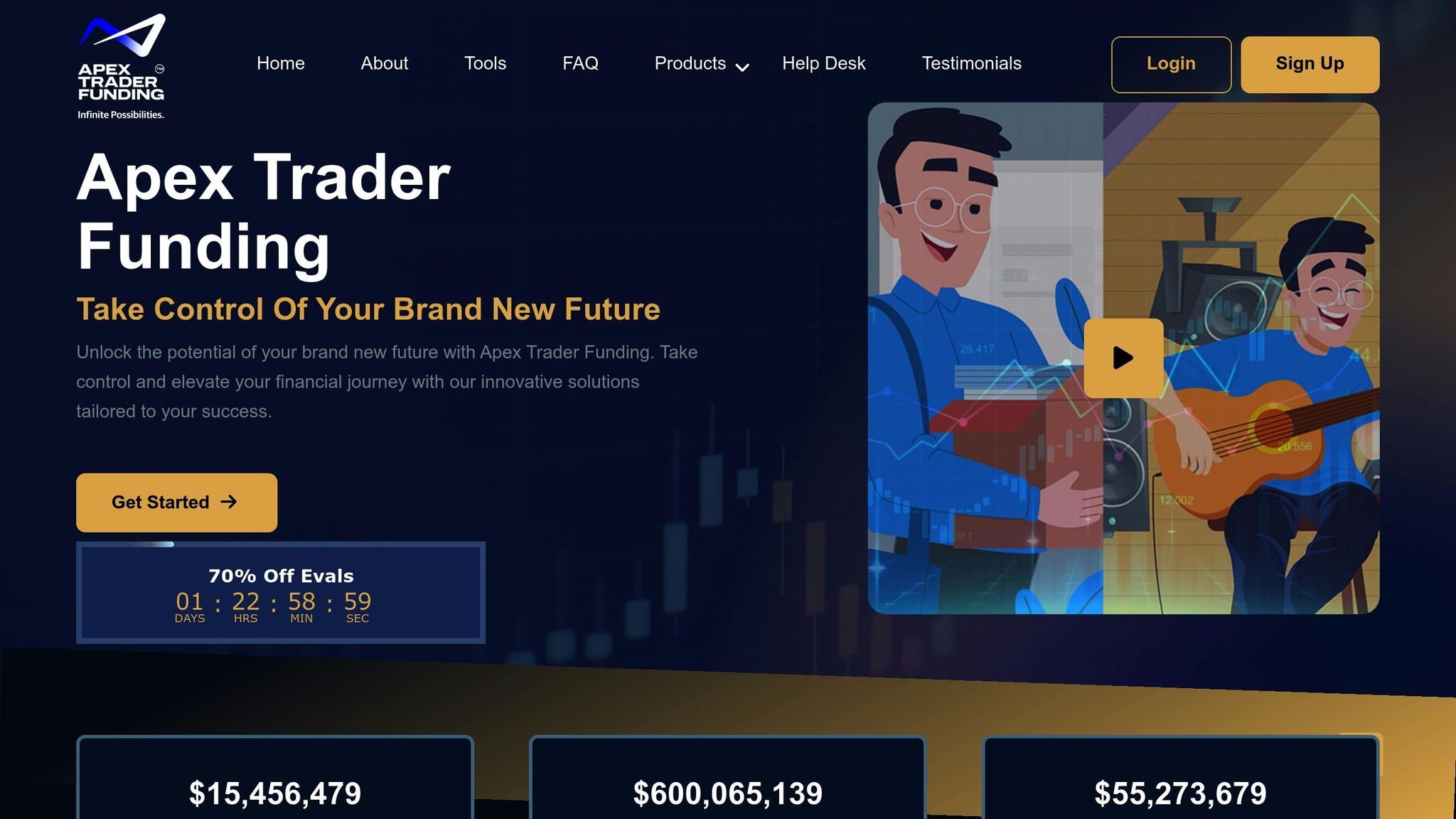
Apex Trader Funding has carved out a niche in the futures market, gaining attention for its aggressive multi-account scaling options. Traders can choose from account sizes ranging between $25,000 and $300,000, with the added benefit of managing multiple accounts simultaneously.
Why it stands out: Apex’s appeal lies in its ability to scale accounts aggressively, its integration with the Rithmic platform, and positive feedback from its trading community. These features make it a go-to choice for futures traders looking to access significant capital.
The firm uses a stepwise profit target system to reward consistent performance, enabling traders to gradually access more funds. This setup highlights how futures funding firms often incentivize disciplined and profitable trading.
Apex supports a variety of platforms, including Rithmic, Tradovate, NinjaTrader, and TradingView. This range allows traders to pick the platform that best suits their trading style. Among these, Rithmic is particularly favored for its low-latency execution, making it a top choice for those who prioritize speed and precision.
When it comes to payouts, traders receive 100% of the first $25,000 in profits and 90% thereafter. Payouts are processed bi-weekly after traders complete at least 8 trading days, ensuring timely profit distribution.
Apex also permits the use of EAs (Expert Advisors) and copy trading, though these come with specific restrictions. This flexibility, combined with its robust platform offerings, broadens its appeal to a wide range of trading strategies.
Instead of a one-time evaluation fee, Apex operates on a monthly subscription model, which includes benefits like no maximum daily loss limits. For risk management, the firm employs a trailing drawdown system. Traders must complete a minimum of 7 trading days but are given unlimited time to hit their profit targets.
With a 4.4/5 rating on Trustpilot, Apex is well-regarded among traders. Many praise its futures-focused approach, straightforward trading environment, and rules designed to support traders.
Overall, Apex Trader Funding sets a high standard in the futures trading space, offering a blend of flexibility, scalability, and trader-friendly policies that make it a leader in the field.
2. My Funded Futures (MFFU)
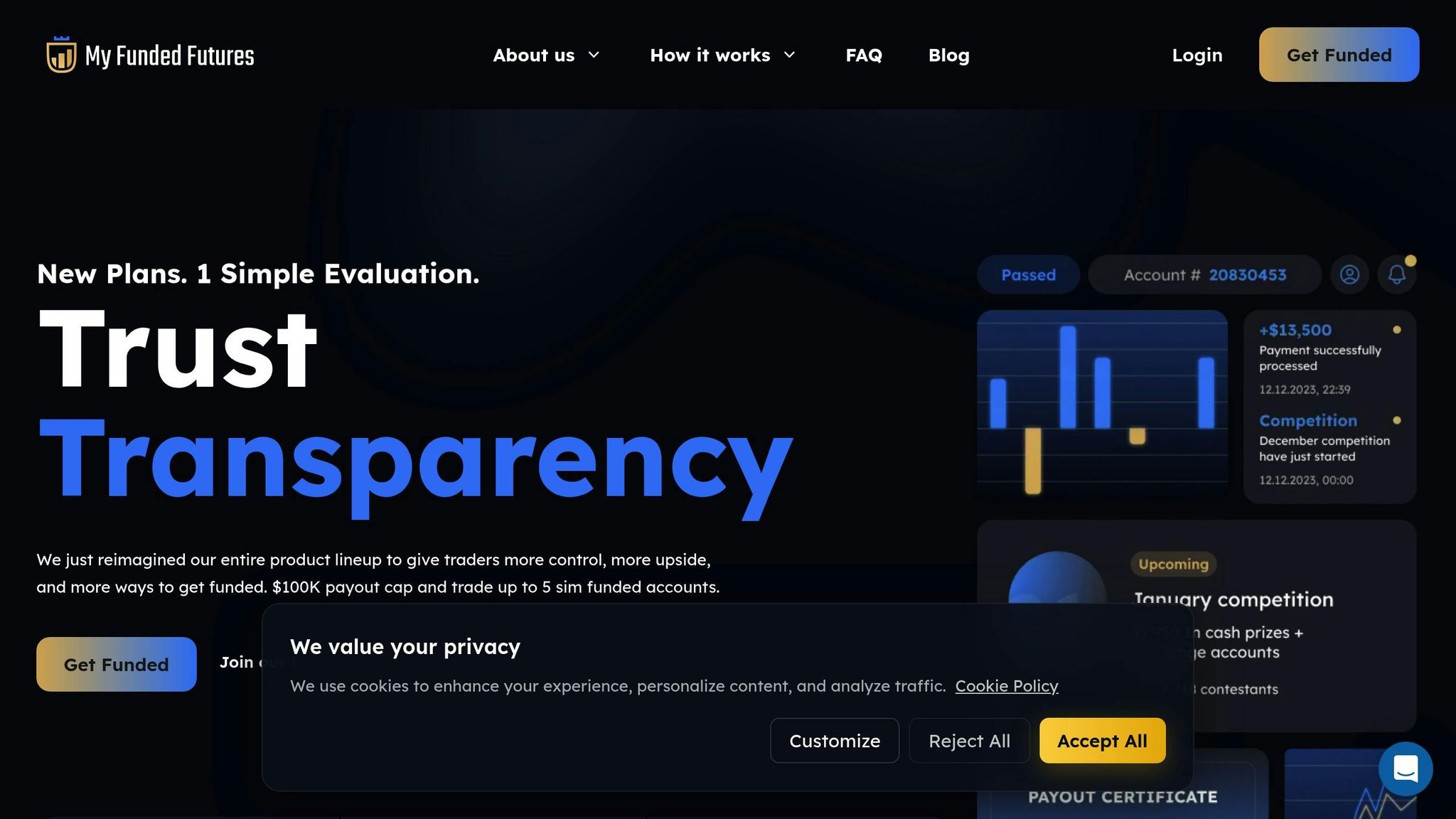
My Funded Futures (MFFU) has made a name for itself in the U.S. futures market by offering simple rules and competitive scaling options, which are key for traders aiming to reach high account sizes by 2026. Their account offerings range from $5,000 to $600,000, with the possibility to scale up to $1,000,000 through a progressive funding system.
Why traders choose MFFU: The firm stands out for its transparent one-step evaluation process, which avoids the hassle of multi-phase challenges. Add to that competitive scaling options, no daily loss limits, and a flexible payout structure, and it’s easy to see the appeal.
MFFU supports a wide range of trading platforms, including Tradovate, NinjaTrader, TradingView, Quantower, Volbook, DxFeed, Atas Orderflow Trading, Volumetrica Trading, and Volsys. This variety ensures traders can stick with the tools and strategies they’re most comfortable using.
The payout structure is another highlight, offering profit splits between 80% and 90% (with the top rate available through booster options). Payout frequency is designed to suit different trading styles:
- The Starter Plan allows payouts after just 5 winning days.
- The Expert Plan offers bi-weekly payouts every 14 days.
- The Milestone Plan provides tailored payout options.
When it comes to risk management, MFFU does away with daily loss limits, instead using a maximum trailing End of Day (EOD) drawdown system. For example, accounts with $50,000 have a 4% EOD drawdown, while accounts with $100,000 and $150,000 have a 3% EOD drawdown, giving traders more room to maneuver in volatile markets.
The firm allows news trading, though its policies on algorithmic and copy trading remain somewhat unclear. However, the broad platform compatibility suggests it likely supports automated strategies.
MFFU provides access to major exchanges such as CME, CBOT, COMEX, and NYMEX, ensuring traders can tap into highly liquid futures markets. It has been recognized as "Best for Fast Payouts For Futures Traders" by Benzinga and boasts a 4.6/5 rating on Prop Firm Match.
With no restrictions on minimum or maximum trading days, MFFU gives traders the freedom to complete evaluations at their own pace.
3. TickTick Trader
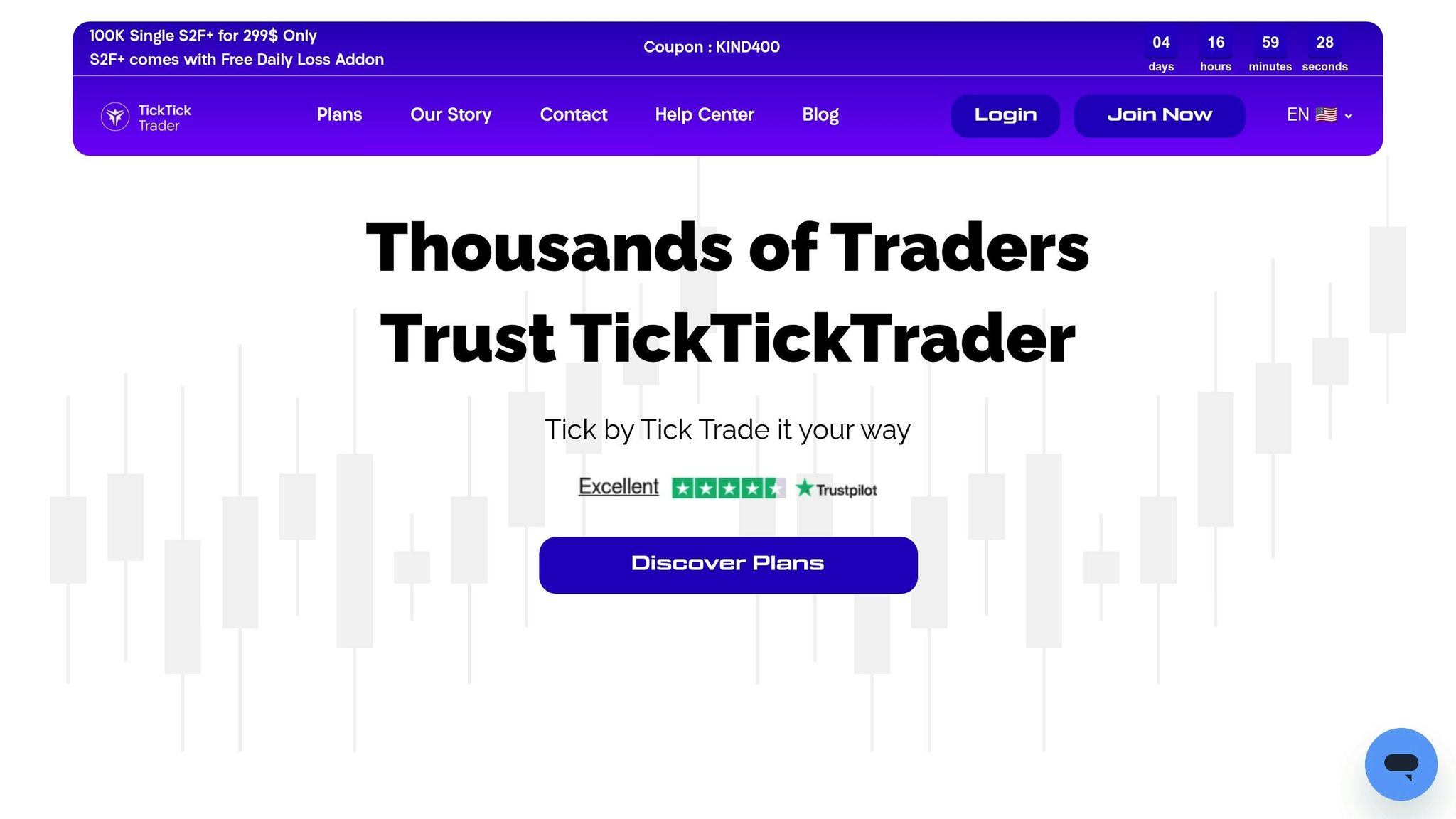
TickTick Trader stands out with its performance-focused accounts and a structured pathway for scaling up. Traders can choose from various initial account sizes and gradually grow their balances through a tiered funding system (check their website for the latest details). This approach provides a clear roadmap for traders aiming to expand their trading capital, supported by competitive evaluation and payout policies.
What makes TickTick Trader appealing? The firm offers attractive profit-sharing arrangements and allows first payouts once traders hit specific profit targets. The evaluation process is designed to be fair, with criteria that are manageable for most experienced traders (confirm specifics on their website).
TickTick Trader supports multiple trading platforms, including NinjaTrader, Tradovate, Quantower, and Rithmic, giving traders the flexibility to work with tools they’re already comfortable using. This compatibility ensures access to professional-grade infrastructure for executing trades.
Risk management at TickTick Trader employs a trailing drawdown system instead of fixed daily loss limits. This approach provides more adaptability, especially during periods of market volatility. The drawdown thresholds depend on the account size (refer to their site for the most accurate parameters).
To qualify, traders must achieve specific profit targets and meet minimum trading day requirements while staying within the trailing drawdown limits. However, there’s no hard cap on the maximum number of trading days, offering some breathing room for traders to meet their goals (verify the latest evaluation details online).
Policies regarding automation, copy-trading, and swing trading are not explicitly outlined, so it’s essential to confirm these rules directly with the firm before starting the evaluation process.
TickTick Trader’s scaling system allows traders to grow their accounts by consistently demonstrating profitability while adhering to the firm’s risk management guidelines. As with any trading firm, it’s crucial to double-check all figures and policies on their website, as they may be subject to change.
4. Bulenox
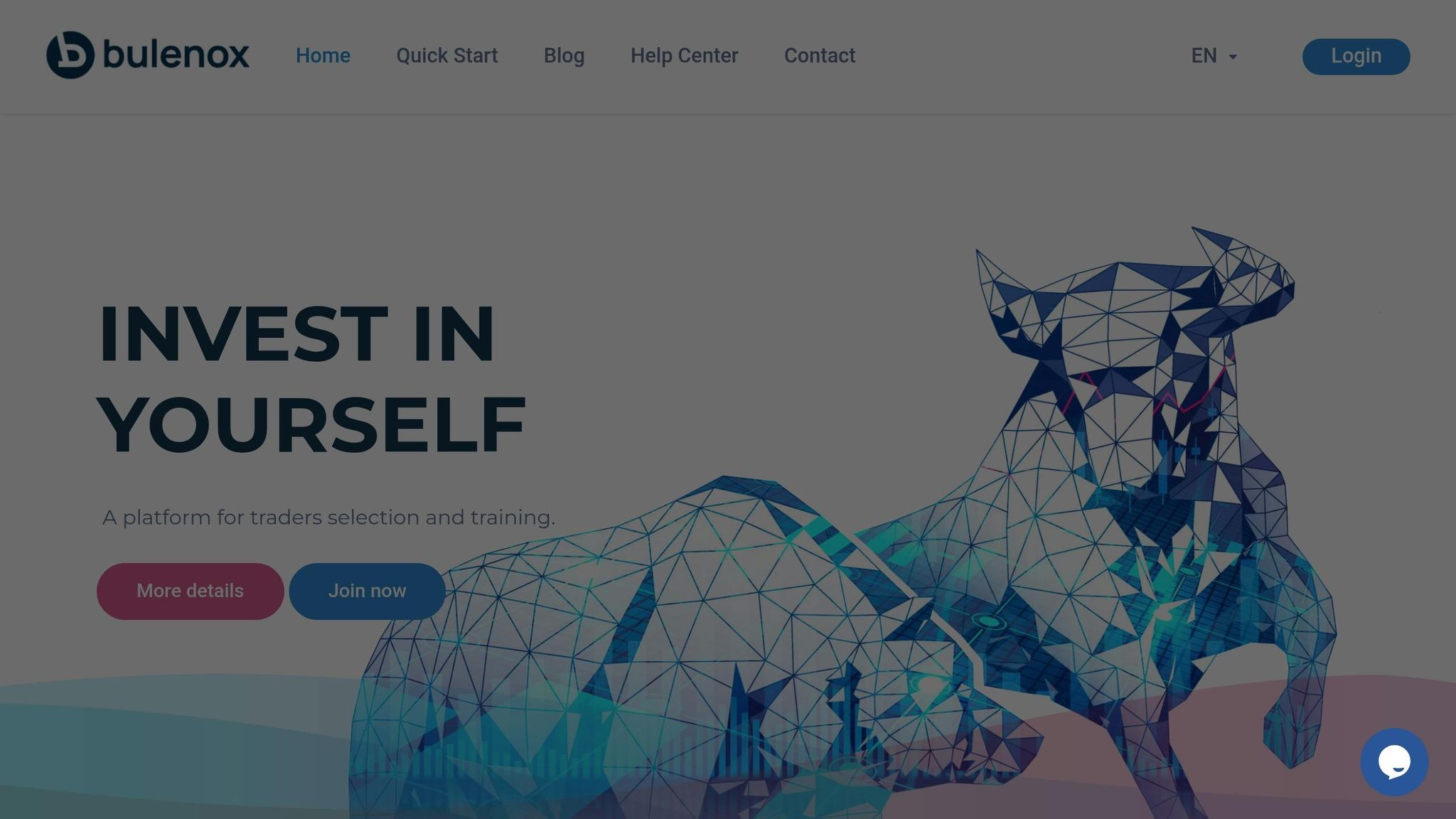
Bulenox provides tiered account options with a pricing structure that’s easy to understand. For example, a $50,000 account comes with an evaluation fee of $96 and an activation fee of $148, making the total cost $244 to get started with this account size.
The platform supports popular trading tools like NinjaTrader, Tradovate, Quantower, and Rithmic. This compatibility ensures traders can operate in familiar environments. However, Bulenox’s policies on scaling and risk management aren’t fully transparent, which might require closer attention.
For specifics on maximum scaling limits, evaluation requirements, and rules regarding automation, copy trading, swing trading, or news trading, it’s best to check directly on Bulenox’s website.
5. Topstep
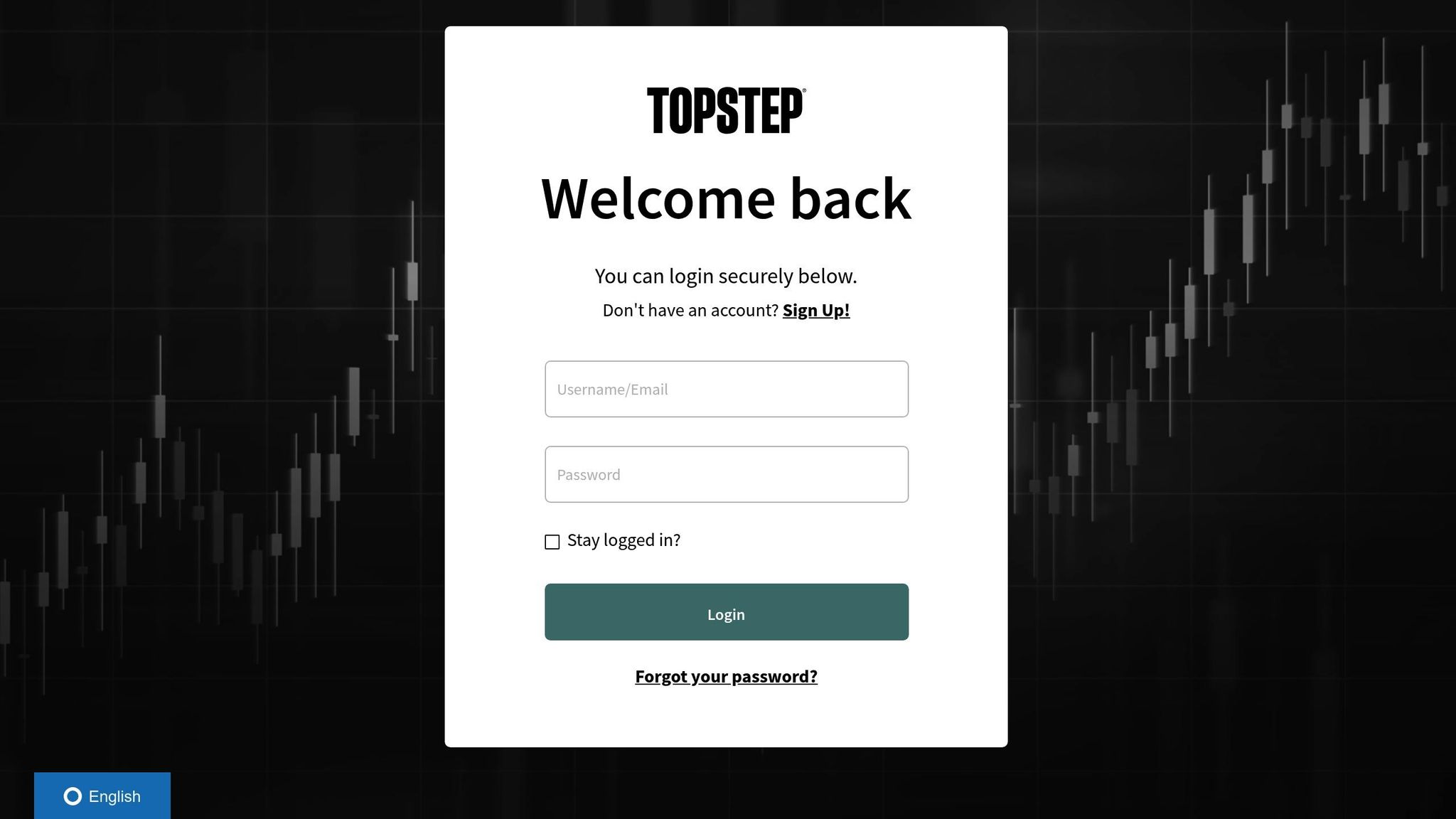
Since its launch in 2012, Topstep has built a reputation as a trusted futures prop firm with a cautious yet effective approach to scaling accounts.
The firm typically offers starting account sizes ranging from $50,000 to $150,000 (check their website for the latest details). While their scaling limits lean on the conservative side, Topstep’s structured process helps traders achieve steady and sustainable account growth over time.
Topstep supports popular trading platforms like NinjaTrader, Tradovate, and Quantower. A key feature of their program is their emphasis on disciplined risk management – traders must demonstrate consistency before they can advance.
Payouts are available after 14 days of meeting profit targets, with traders earning between 50% and 90% of profits, depending on their performance.
The firm has strict policies regarding automated strategies, allowing limited use only with prior approval and under specific conditions. Copy trading is generally prohibited, as Topstep prioritizes the development of individual trading skills.
For swing traders, Topstep allows overnight positions, provided traders stay within defined risk parameters. Their conservative framework, which includes tighter drawdown rules, is designed to manage risk effectively as accounts scale.
Topstep is open to U.S. traders and operates with strong regulatory compliance. They also offer educational tools and support to help traders improve. However, some traders have noted that the firm’s scaling process can feel slower compared to newer, more aggressive programs.
To stay up to date, traders should review Topstep’s current scaling limits and automation policies directly on their website. This methodical approach makes Topstep a standout option for those seeking a disciplined path to trading success.
6. Take Profit Trader
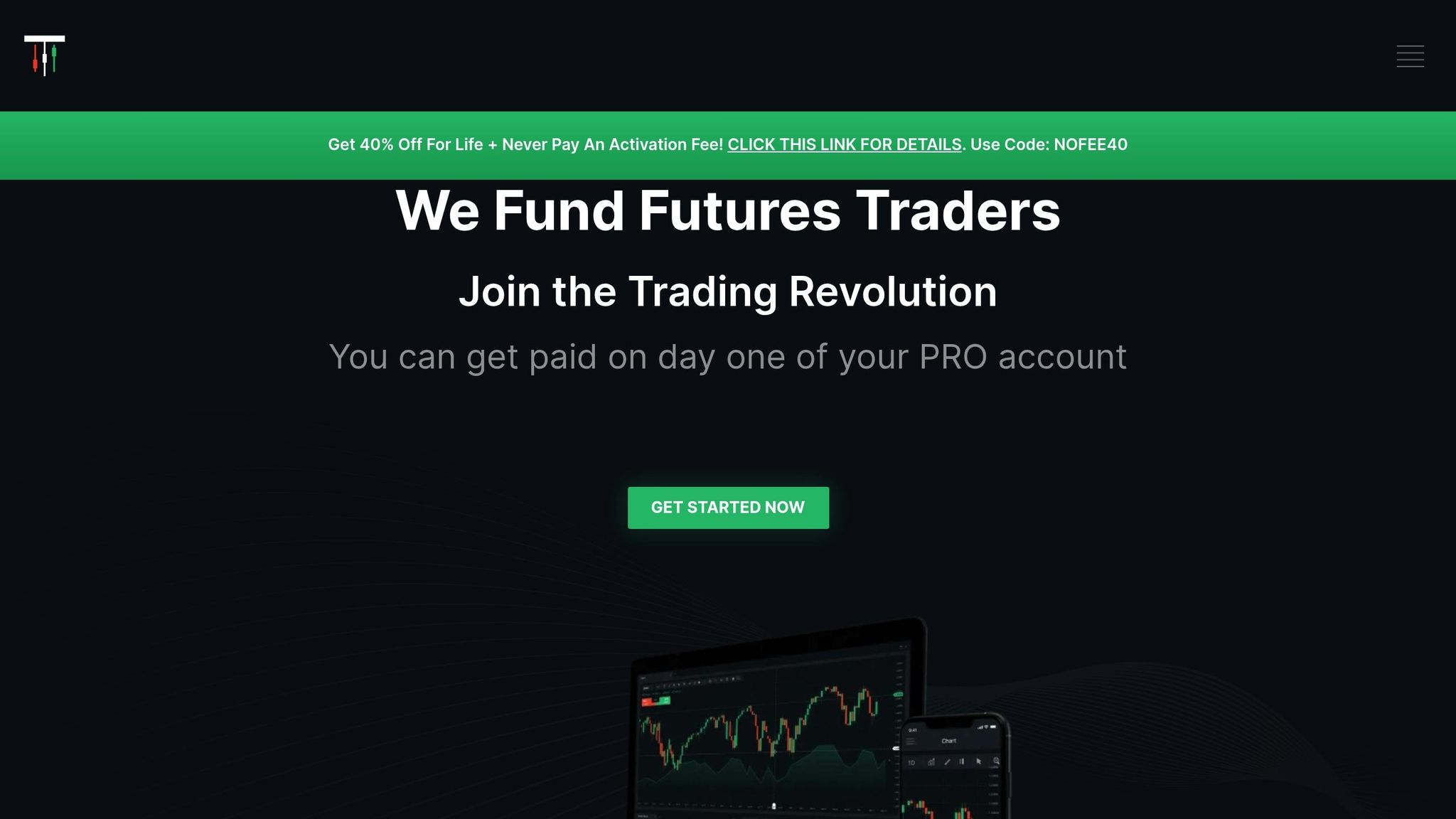
Take Profit Trader provides an evaluation starting at just $102, with no activation fees. Plus, you can snag a 40% discount by using the code PW. Be sure to check their website for the most up-to-date details on account limits and scaling options, as these terms may change over time.
This low-cost entry fee, combined with the discount, complements their straightforward scaling approach – something that resonates with the practices of top futures trading firms.
7. TradeDay
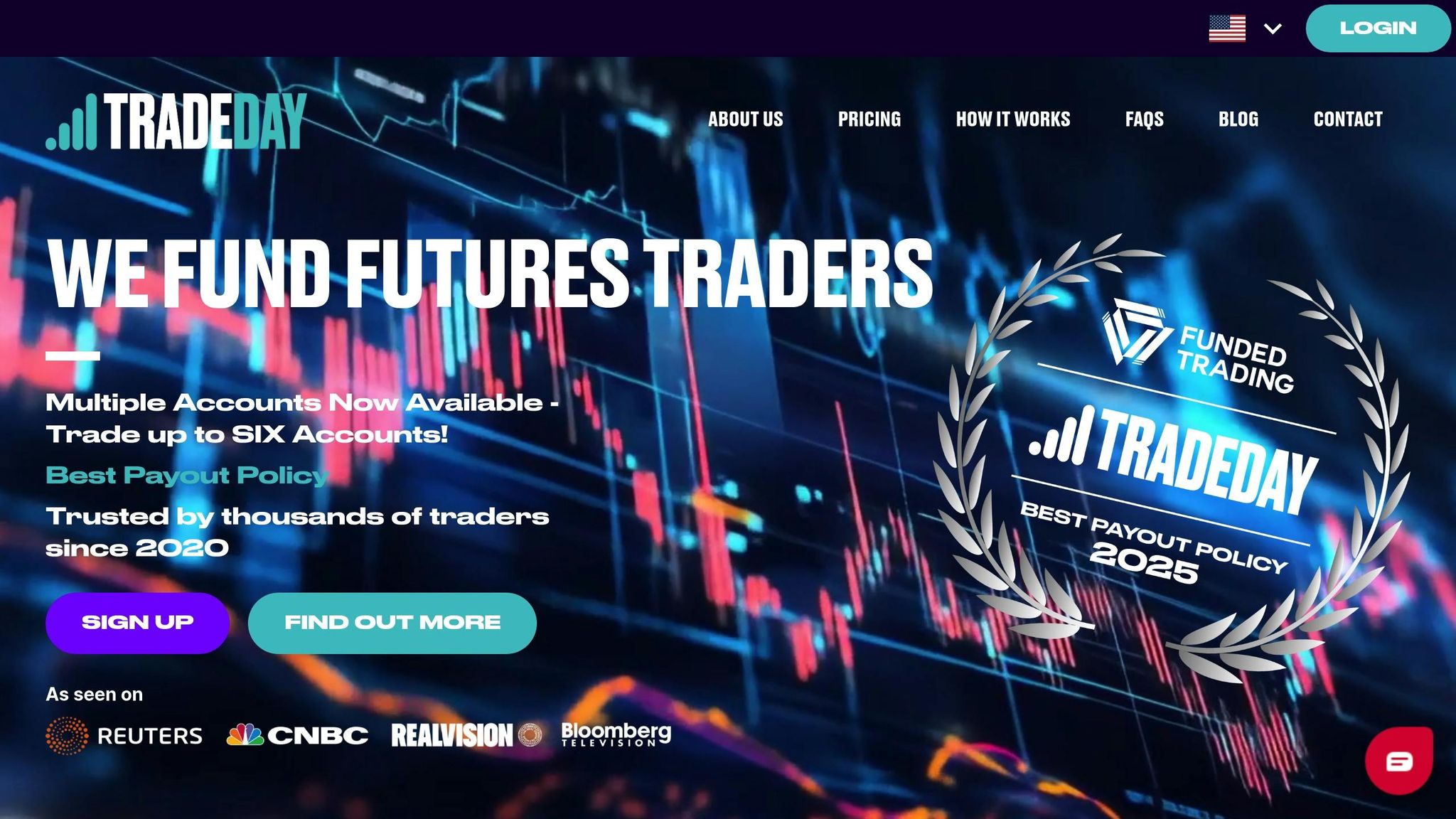
NEVER MISS A TRADE
Your algos run 24/7
even while you sleep.
99.999% uptime • Chicago, New York, London & Amsterdam data centers • From $59.99/mo
TradeDay has carved out a niche in the futures prop trading world by combining a strong focus on trader education with competitive account offerings. This makes it an appealing choice for traders aiming to sharpen their skills while working toward larger account sizes.
The firm uses a step-by-step growth model that ties account scaling to profit targets and consistent performance. Traders are required to meet profit goals while staying within strict drawdown limits to move up. This method mirrors the industry’s broader shift toward structured profit targets and disciplined risk management. By prioritizing a steady and measured approach, TradeDay offers traders a clear path to growth without relying on flashy promotions.
Thanks to its structured framework, TradeDay has earned a reputation as one of the top futures prop firms. With professional operations, straightforward rules, and transparent payout policies, it’s a dependable choice for serious traders looking for mid-to-high-tier scaling opportunities.
For specifics on automation policies, copy-trading restrictions, platform compatibility (including Rithmic, NinjaTrader, and Quantower), and scaling caps, it’s best to check directly with TradeDay to ensure their offerings align with your trading needs and style.
8. The Futures Desk
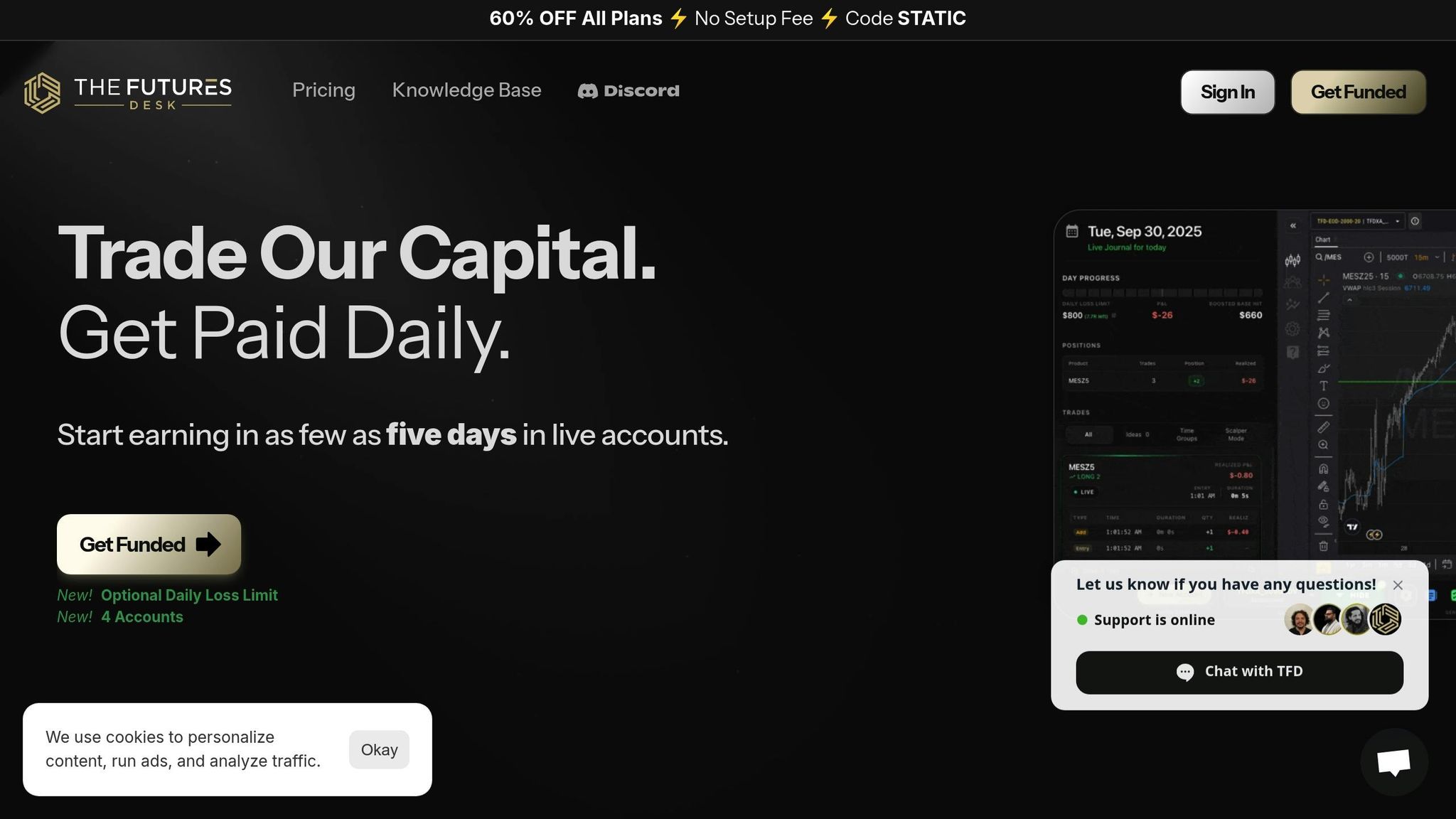
The Futures Desk brings a global angle to the world of futures trading, with operations spanning both the UK and the US. This setup allows traders to navigate different regulatory environments and take advantage of varied trading sessions. However, details about their offerings – such as account limits, scaling caps, platform compatibility, and policies on algorithmic, copy, swing, or news trading – are not widely available.
If you’re considering The Futures Desk, it’s crucial to double-check their current account limits, scaling options, and platform support directly with the firm. Policies and conditions may shift over time, so staying updated is essential.
9. BluSky Trading
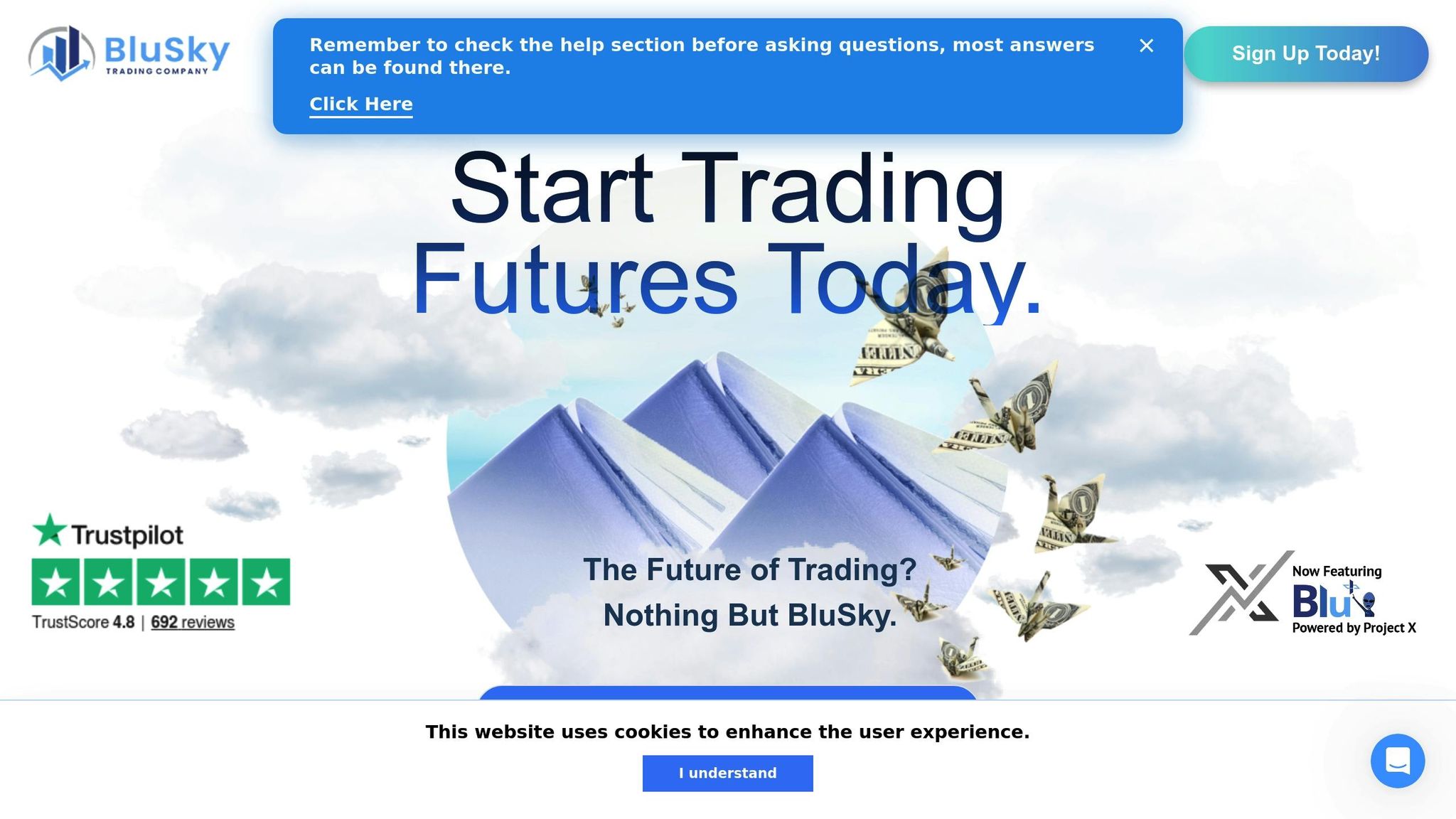
BluSky Trading starts traders off with a $50,000 account. While the company doesn’t publicly share details about a maximum scaling cap or policies on copy trading, automation, or swing trading, these rules might evolve over time. For the most accurate and up-to-date information, it’s best to reach out to the firm directly.
10. Leeloo
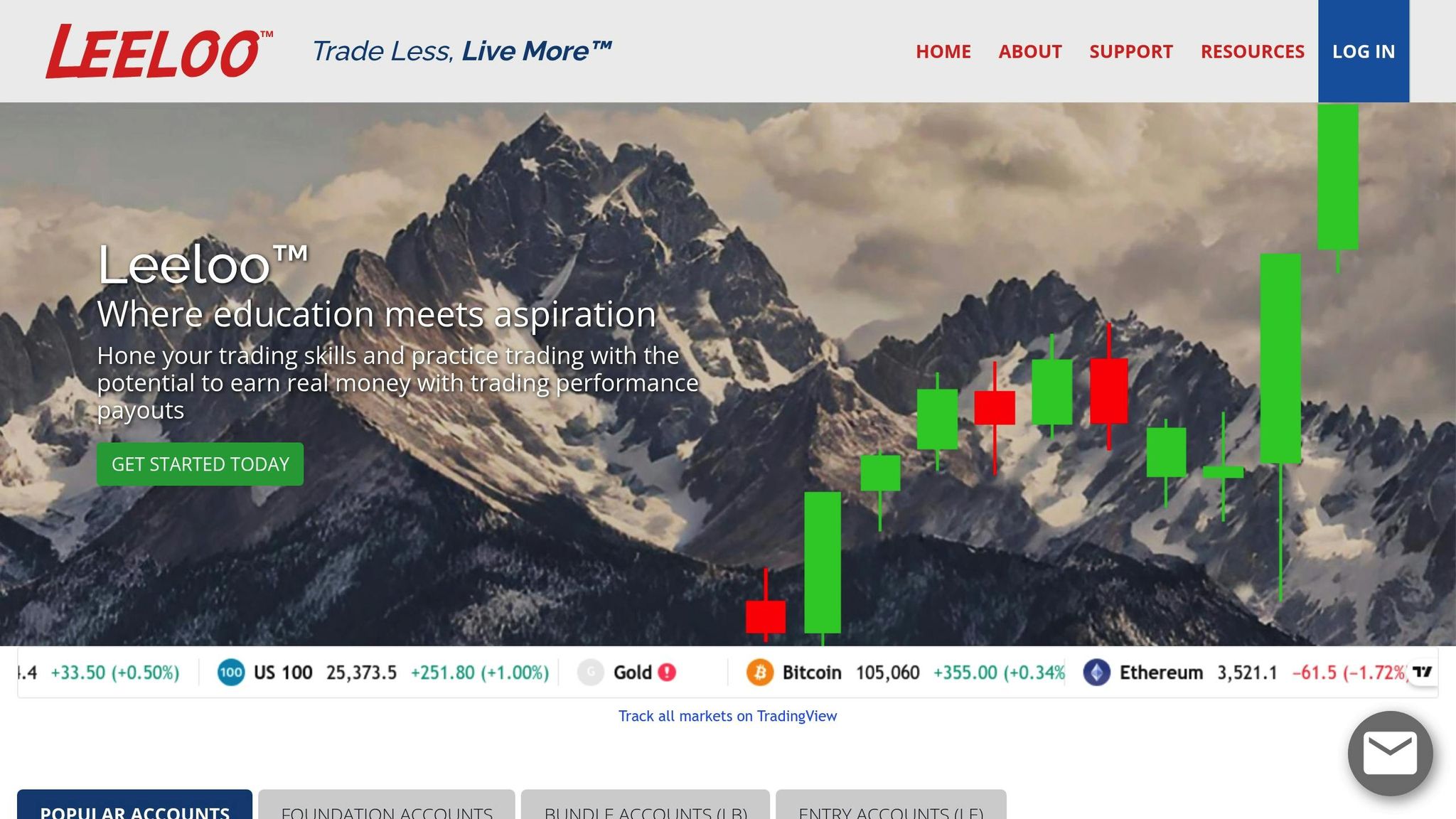
Leeloo doesn’t share much publicly about key aspects like maximum initial account sizes, scaling limits, payout structures, platform compatibility, or automation policies. This lack of transparency makes it harder to compare Leeloo with firms that openly detail their funding options and growth opportunities.
If you’re considering Leeloo for large-scale trading, it’s a good idea to reach out to their support team for clarification on the following:
- The largest initial account size they offer
- Their total scaling limits and any conditions to reach them
- Supported trading platforms and available data feeds
- Rules for swing trading, news trading, and automated strategies
- Requirements for minimum trading days or maintaining consistency
This limited availability of information sets Leeloo apart from some of the other firms discussed earlier. To avoid surprises, it’s crucial to confirm the latest terms directly with Leeloo’s support team before making any decisions.
11. OneUp
OneUp Trader offers an enticing opportunity for traders with its $100,000 funded account. The account comes with a $6,000 profit target, a maximum position size of 12 contracts, and a profit split ranging from 90% to 100%. Additionally, it features a $3,500 trailing drawdown, calculated in real time during trading hours, and no daily loss limit. The evaluation fee is set at $300, making it a relatively budget-friendly choice for those exploring futures prop firm challenges.
However, OneUp Trader leaves some important questions unanswered. Details about scaling programs – such as how much the account can grow, options for exceeding the $100,000 account size, or the total scaling cap – are not disclosed. Policies on automation, copy trading, minimum trading days, platform compatibility, news trading, and swing trading are also missing. This lack of clarity means traders need to reach out directly to confirm these specifics before committing.
This gap in transparency highlights a broader issue within the industry. For traders aiming to manage larger accounts, clear guidelines on scaling and risk management are crucial. Without this information, it’s difficult to fully gauge where OneUp Trader stands among high-cap prop firms.
12. UProfit
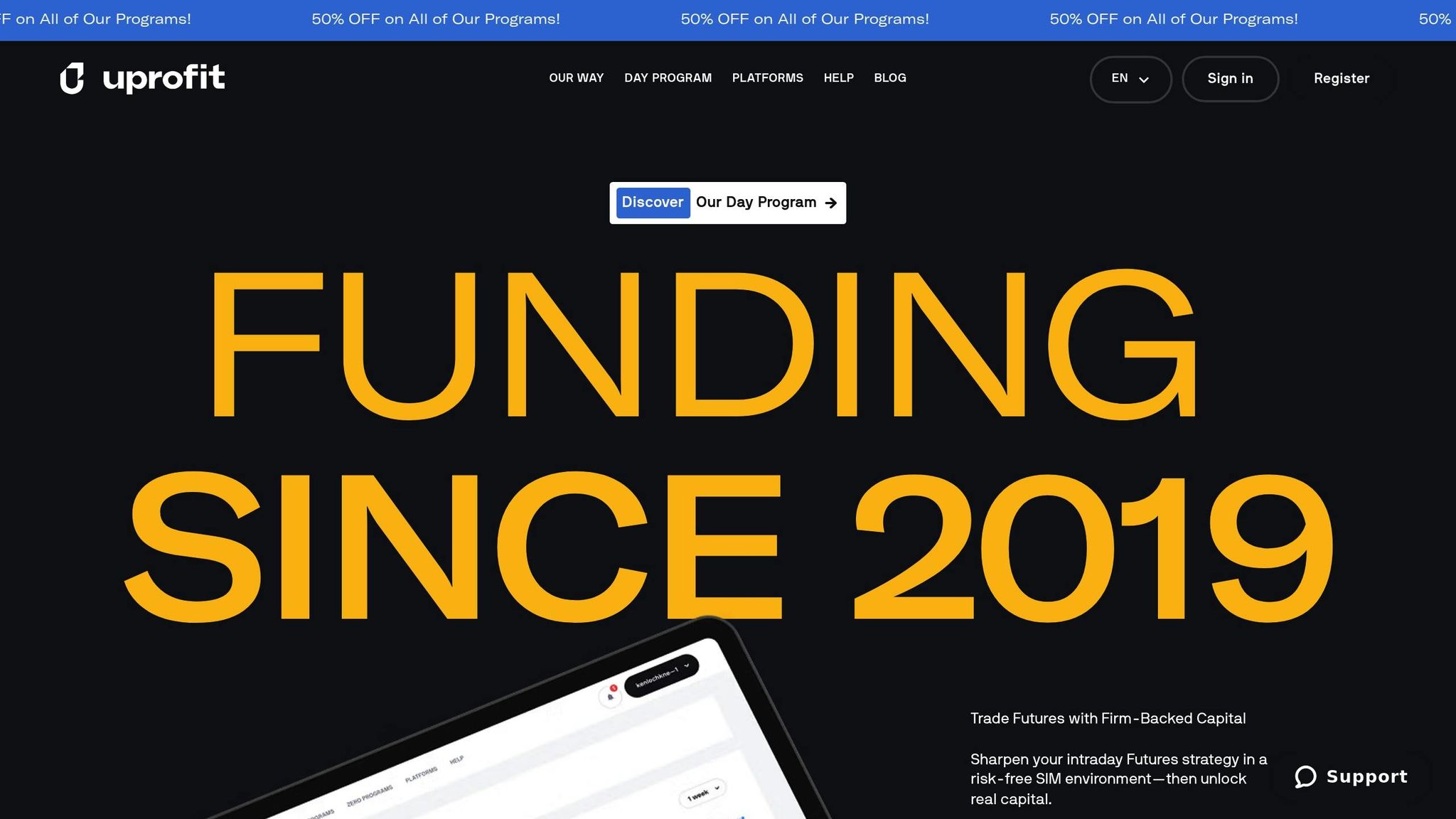
UProfit stands out among mid-tier futures prop firms by offering a $100,000 funded account for an evaluation fee of $315. The firm keeps things relatively simple, focusing on a single account option with a $6,000 profit target and an 80%-100% profit split. Risk management parameters include a $2,200 daily loss limit, a $3,000 trailing drawdown (calculated at the end of the day), and a maximum position size of 12 contracts. However, UProfit doesn’t provide much in terms of scaling opportunities or details about platform compatibility, automation, copy trading, or minimum trading days. This makes it a straightforward choice for traders who prefer simplicity over scalability.
For those looking to grow beyond the initial account size or seeking more operational flexibility, UProfit may not be the best fit. Its focus on a basic evaluation model makes it more suitable for traders prioritizing a no-frills experience over aggressive growth options.
| Feature | UProfit Specification |
|---|---|
| Account Size | $100,000 |
| Evaluation Cost | $315 |
| Profit Target | $6,000 |
| Profit Split | 80%-100% |
| Daily Loss Limit | $2,200 |
| Trailing Drawdown | $3,000 (End-of-day calculation) |
| Max Position Size | 12 Contracts |
13. Elite Trader Funding (ETF)
Elite Trader Funding (ETF) outlines several important risk management policies, though it doesn’t share all numerical specifics. Here are the key points:
- Trailing Drawdown: ETF applies a trailing drawdown policy, calculated at the end of each trading day. This helps manage risk, particularly in volatile market conditions.
- Algorithmic and Copy-Trading: ETF does not provide detailed guidelines regarding algorithmic or copy-trading strategies. Traders interested in these options should reach out to the firm directly for clarification.
These policies highlight ETF’s focus on maintaining disciplined risk management practices. For the most accurate and updated information, it’s best to contact ETF directly.
14. FundingPips
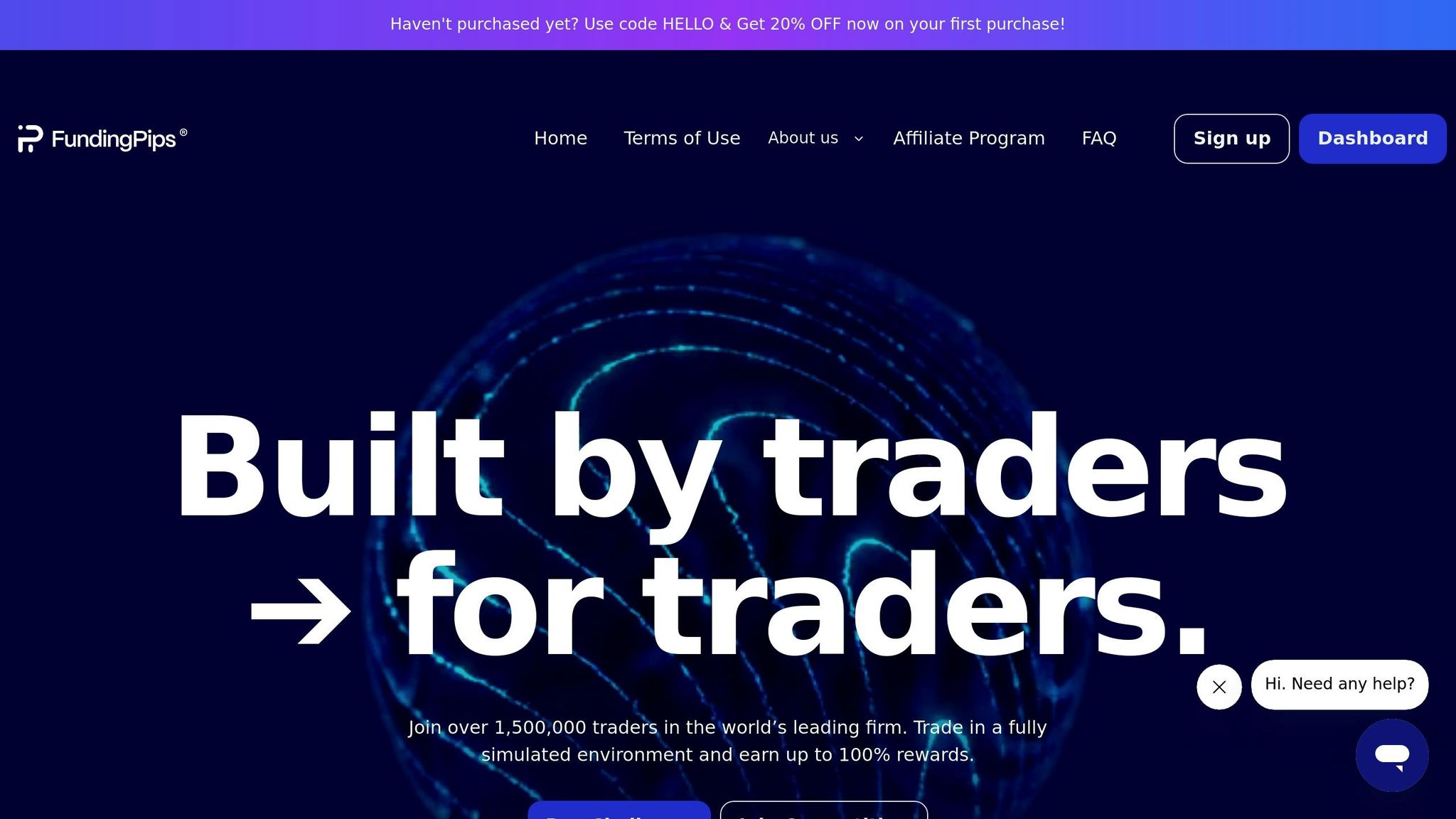
FundingPips is a forex and CFD proprietary trading firm that provides traders with a structured system to grow their accounts on MT4 and MT5 platforms.
Why it ranks: FundingPips stands out for its well-defined progression system, which allows traders to scale their accounts over time while offering competitive profit splits and flexibility in trading strategies.
The firm’s step-by-step model enables traders to move through account tiers based on their performance. Details about initial account sizes, scaling limits, profit splits, and payout schedules are available on their website. This transparency ensures traders can plan their growth effectively.
FundingPips supports a variety of trading methods, including the use of Expert Advisors (EAs) and automated strategies, though specific policies for automation and copy trading depend on the account type. News trading is also allowed, but there may be restrictions during major economic events.
For traders in the U.S., eligibility depends on current regulations. It’s crucial to review these details on the FundingPips website before applying.
The firm emphasizes risk management with daily and maximum drawdown limits, as well as trailing adjustments as accounts grow. Consistency is key – traders must demonstrate steady performance to advance to higher account tiers. Like other top proprietary trading firms, reaching higher caps requires disciplined and consistent trading, aligning with industry standards for scaling success.
15. FundedNext
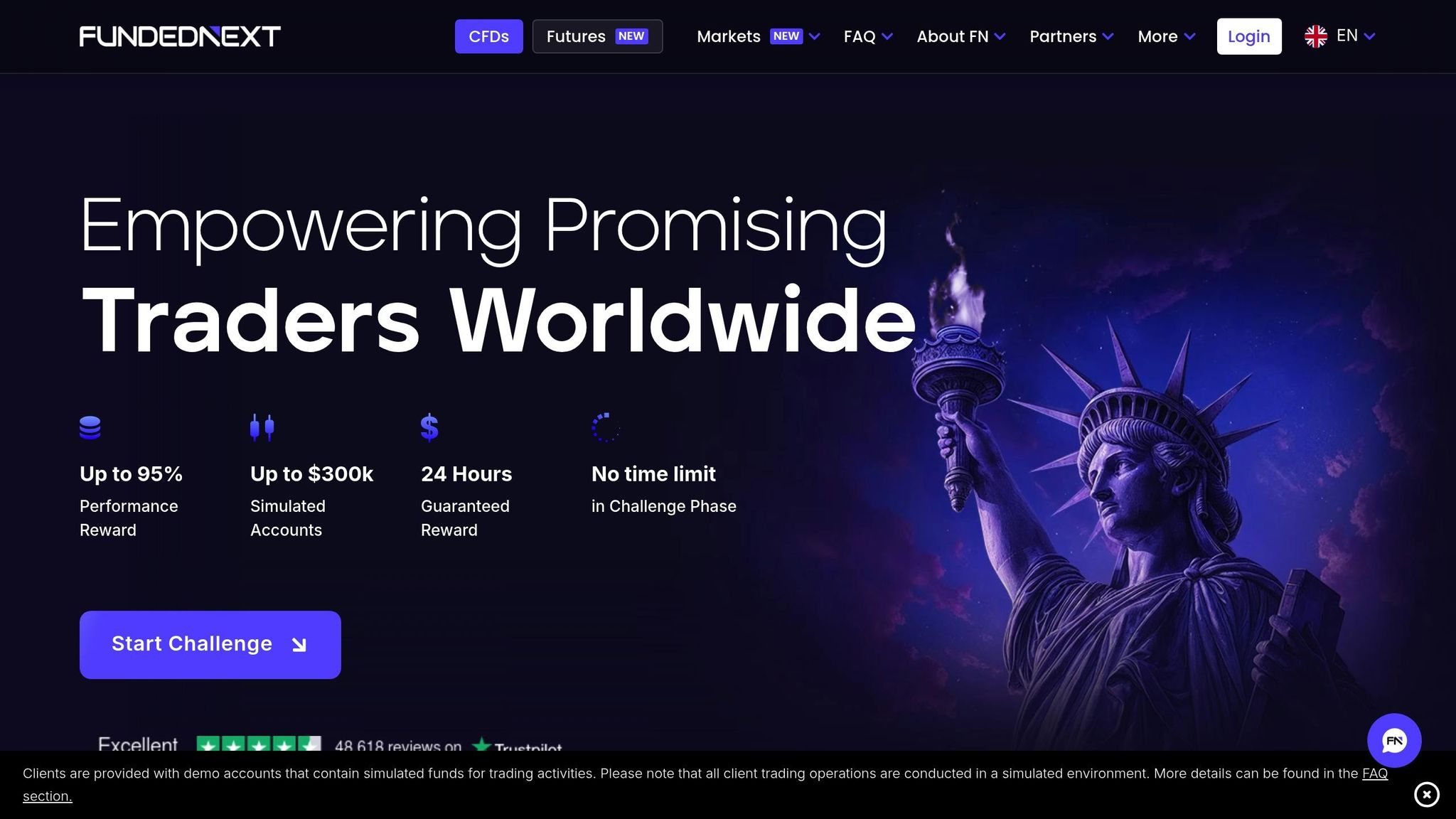
FundedNext provides a variety of programs, each designed with specific scaling structures and maximum account limits. Its CME futures division, known as FundedNext Futures, supports platforms like Tradovate and NinjaTrader. NinjaTrader, in particular, stands out for its advanced charting tools, backtesting capabilities, and automation options, making it a favorite among technical traders.
The platform allows a wide range of trading strategies, excluding latency arbitrage and overnight holding. This flexibility makes it a solid choice for traders using algorithmic and technical setups.
16. The5ers

The5ers stands out among prop trading firms with its deliberate, long-term scaling model. Based in the UK, this firm focuses on the forex and CFD markets, offering traders access to both MT4 and MT5 platforms. For specific account ceilings and details, traders can refer to their website. Unlike firms that prioritize rapid growth, The5ers emphasizes steady, consistent progress, making it a solid choice for traders seeking a more measured approach.
Platform and Trading Options
The5ers supports both MT4 and MT5 platforms, which allow for automated trading and copy trading within their established guidelines. This adaptability provides traders with the tools they need while maintaining structure, contributing to the firm’s positive market reputation.
Reputation and Trader Feedback
The5ers has earned a strong reputation in the trading community, reflected in its impressive 4.9/5 Trustpilot score based on over 18,000 reviews. Traders frequently praise its transparency and supportive environment, as well as its unique approach to scaling, which prioritizes skill development over quick profits. For those considering a long-term growth strategy, this reliability and focus on consistency are crucial.
According to Rough Draft Atlanta, The5ers’ growth model is better suited for steady traders rather than those with an aggressive scalping style.
According to Rough Draft Atlanta, The5ers’ growth model is better suited for steady traders rather than those with an aggressive scalping style.
Scaling Approach
The firm’s scaling model is designed for traders who value patience and consistency. To progress, traders must meet profitability targets over time, making this approach ideal for those willing to focus on sustainable growth. However, if you’re managing multiple accounts or using automated strategies, it’s essential to review The5ers’ policies on expert advisors (EAs) and copy trading. Ensuring alignment between their requirements and your trading strategy is key to success within their framework.
17. E8 Markets
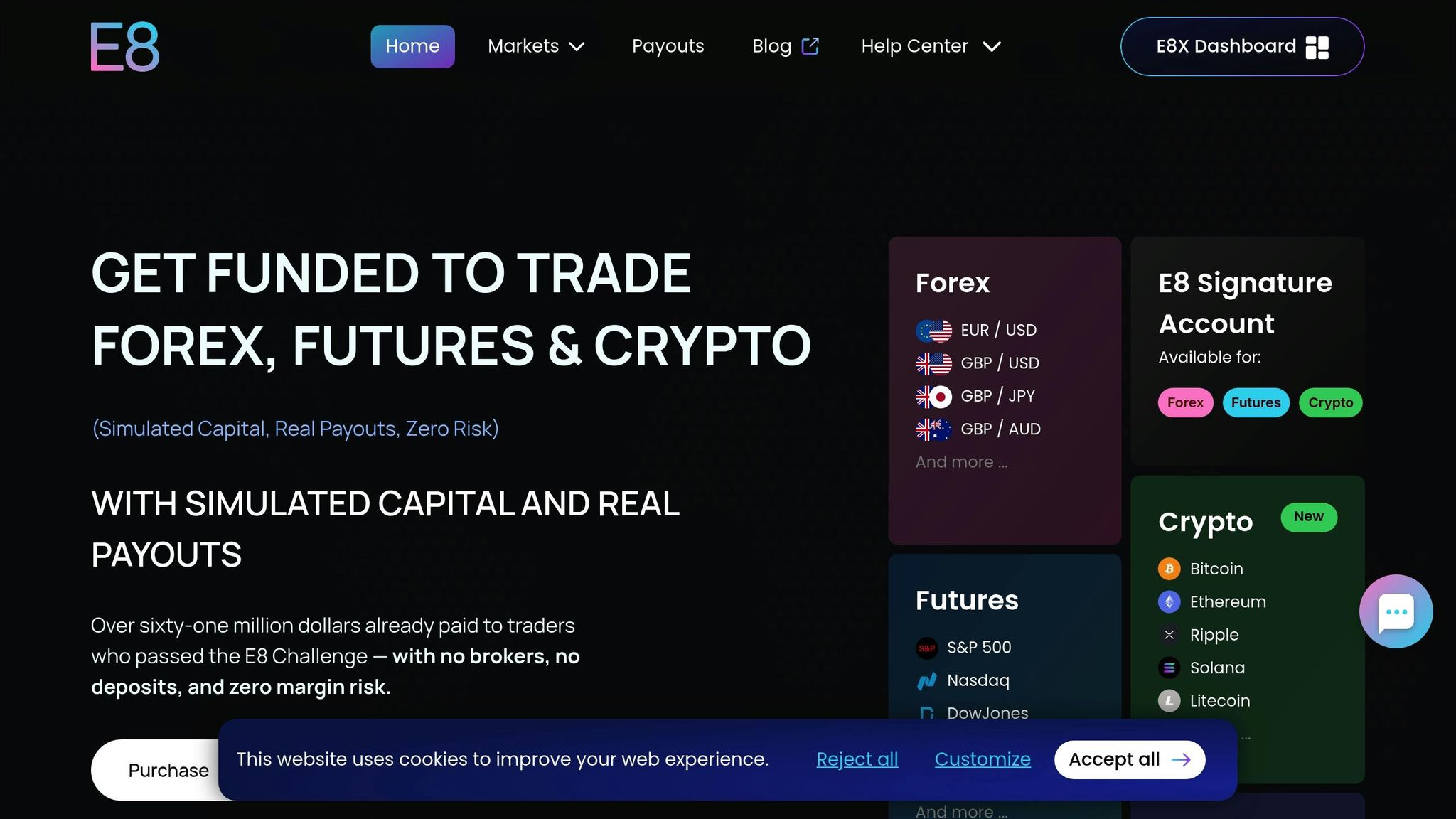
E8 Markets provides a straightforward scaling program for forex and CFD traders, offering the opportunity to manage up to $2.4 million in capital through its structured growth path. With four years of operation under its belt, the firm has earned a strong reputation, boasting a 4.8 out of 5 rating from 388 reviews.
Platform and Market Access
E8 Markets supports trading across a wide variety of markets, including cryptocurrencies, energy, forex, indices, and metals. This broad market access allows traders to diversify their strategies while working toward the $2.4 million allocation cap.
Scaling Model and Growth Path
The firm’s scaling program is designed to reward consistent trading performance. While specific profit targets and drawdown rules should be reviewed directly on their website, the program provides a clear path for traders to grow their capital allocation systematically. This structure, combined with access to diverse markets, creates a robust framework for traders aiming to reach the maximum allocation.
Market Presence and Popularity
With a rating of 4.8 out of 5 based on hundreds of reviews and 438,021 visits recorded in May 2025, E8 Markets has demonstrated strong traction and growing popularity in the trading community.
STOP LOSING TO LATENCY
Execute faster than
your competition.
Sub-millisecond execution • Direct exchange connectivity • From $59.99/mo
Policy Insights
Before diving in, it’s essential to review the firm’s policies on automation, copy trading, and news trading. These rules can have a significant impact on your ability to achieve the maximum allocation and should align with your trading approach for the best results. Check their website for detailed policy guidelines to ensure your strategy fits within their framework.
18. City Traders Imperium (CTI)
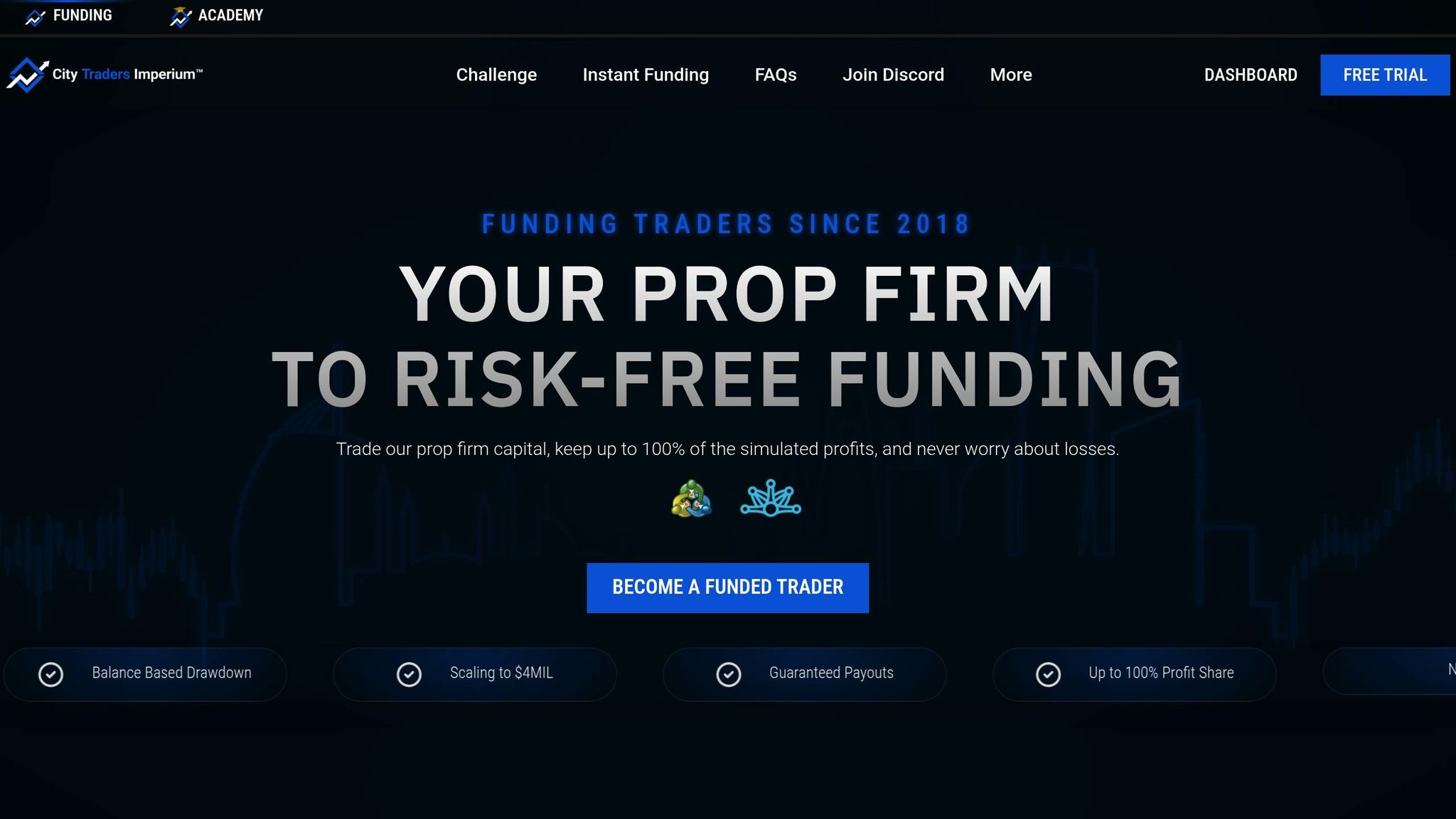
City Traders Imperium (CTI) has earned a strong reputation in the forex trading world, recognized as the Overall Best Prop Firm in 2025 for its flexibility in payouts, instant funding options, and loyalty rewards. With a 4.1/5 TrustPilot score and a focus on trader education, CTI offers traders a well-rounded pathway to access substantial capital in the forex market. Let’s break down what makes CTI stand out, including its programs, platform options, payout structure, and commitment to trader development.
Scaling Opportunities and Account Growth
CTI provides traders with scalable programs that allow for growth up to $4 million in capital. Their offerings include four main programs, each catering to different trader needs and experience levels:
- Two-Step Challenge
- One-Step Challenge
- Instant Funding
- Instant Funding Pro
Both the Two-Step Challenge and Instant Funding programs offer scaling potential up to $4 million, while the One-Step Challenge caps at $200,000. CTI supports trading on MT4, MT5, and Match-Trader platforms, giving traders the flexibility to choose their preferred trading environment.
Platform Options and Trading Flexibility
CTI’s trading policies are designed to offer flexibility. Traders can use restricted Expert Advisors, engage in copy trading, and even trade during news releases. Additionally, weekend holding is permitted, which can be a game-changer for certain trading strategies.
Profit Sharing and Payout Structure
One of CTI’s standout features is its profit-sharing model, which can reach up to 100%. Here’s how the profit splits work across different programs:
- Two-Step and One-Step Challenges: Start at 80% profit splits.
- Instant Funding Programs: Begin at 50% but scale up to 100% over time.
Payouts are processed efficiently, with challenge-based accounts offering weekly payouts, while instant funding accounts provide on-demand payouts. Most payouts are processed within 1-2 business days, ensuring quick access to earnings.
Program Accessibility and Market Diversity
CTI’s programs are accessible to a wide range of traders, with fees starting at $29 for the One-Step Challenge and going up to $299 for Instant Funding Pro. Account sizes range from $2,500 to $200,000, making it easier for traders at different levels to get started.
The firm also offers access to multiple asset classes, including forex, indices, commodities, stocks, and crypto. This broad market access enables traders to diversify their strategies while working toward higher capital allocations.
Focus on Trader Development
What truly sets CTI apart is its dedication to trader growth. The firm emphasizes education and community building, providing resources that help traders sharpen their skills while scaling their accounts. This focus on learning, combined with consistent payouts, makes CTI an appealing choice for traders aiming to grow both their capital and expertise.
19. Goat Funded Trader
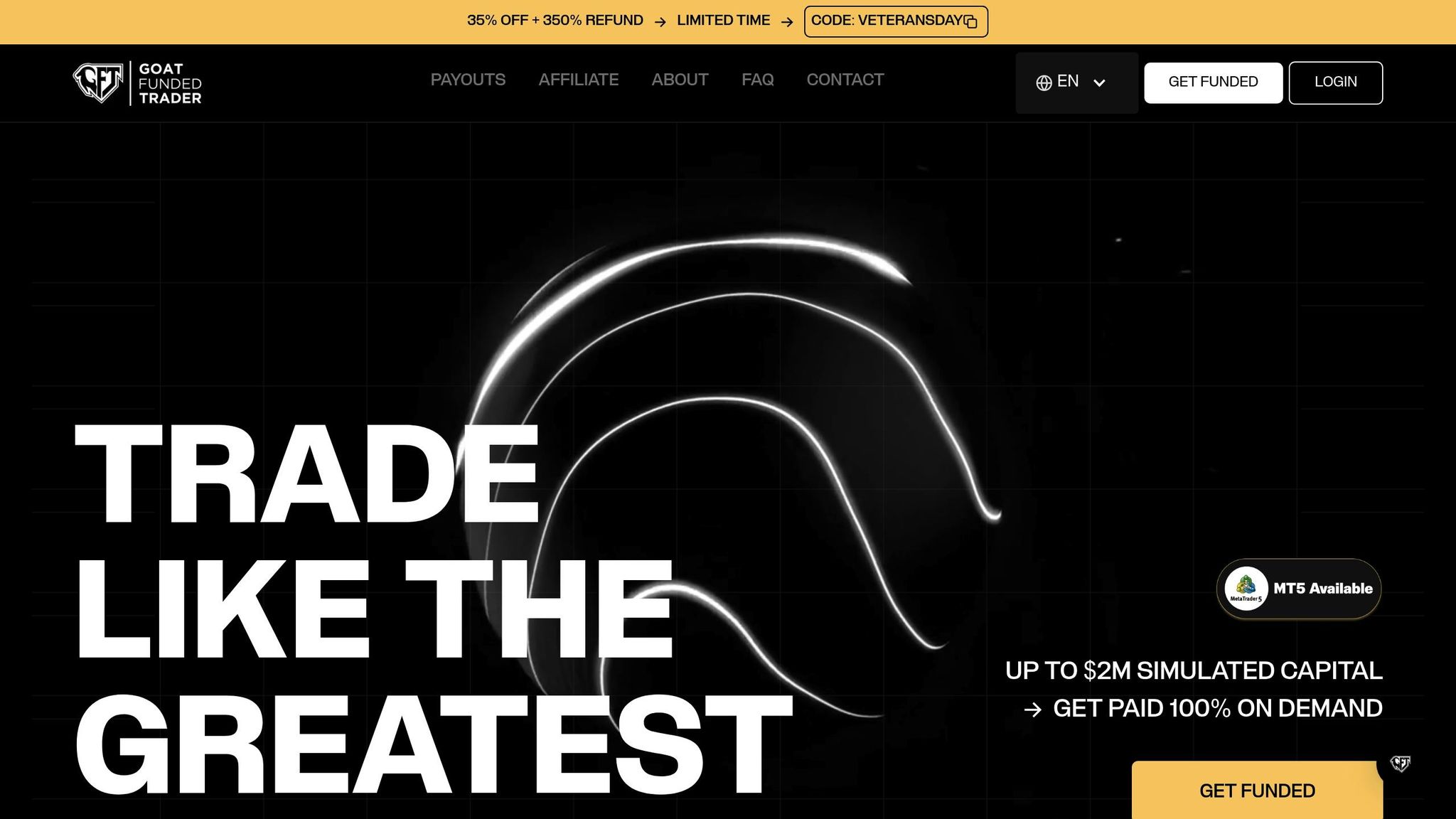
Goat Funded Trader offers a program designed for Forex and CFD traders using MT5 and cTrader platforms. Traders can start with an account cap of up to $200,000 and grow it to a maximum of $800,000. The firm provides an attractive profit-sharing model, starting with an 80% split and potential upgrades to 100%. This scaling opportunity, paired with flexible payout options, makes it a compelling choice for traders looking to increase their capital. With support for multiple platforms, Goat Funded Trader simplifies the process of account growth. Be sure to check their website for the latest details on account scaling, requirements, and payout policies.
20. Alpha Capital Group
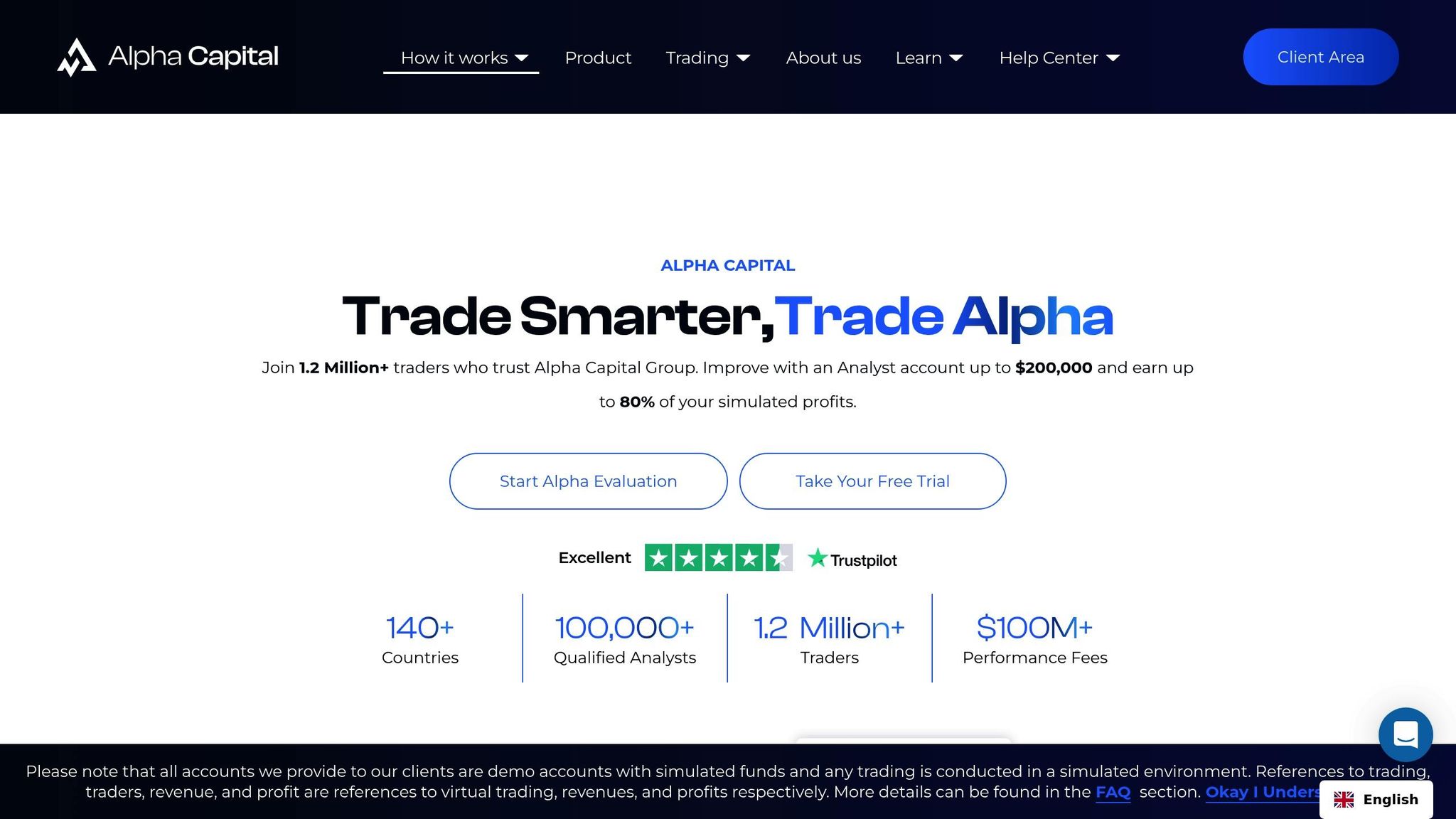
Next up in our review of top proprietary trading firms is Alpha Capital Group, headquartered in Great Britain. The firm boasts a solid 4.4-star rating from 741 reviews, and it offers traders the opportunity to manage accounts of up to $400,000. Its Discord community has also earned positive feedback, with a rating of 4.6 based on 2 verified reviews.
When it comes to trading platforms, support can vary, so it’s a good idea to double-check the firm’s website for the most accurate and up-to-date information. However, some important details – such as payout terms, profit splits, automation policies, and eligibility for U.S.-based traders – are not clearly outlined. For these specifics, visiting their website is essential.
Comparison Tables and Analysis
Prop trading is generally divided into two main categories: futures and forex/CFD firms. Each type has its own account limits, scaling models, and unique features. Below, you’ll find detailed comparison tables to help you weigh your options.
Futures Prop Firms Comparison
| Firm | Country/Region | Platforms | Initial Max Size | Max Scaling Cap | Payout Split (up to) | First Payout (days) | Algo/Bot Policy | Copy-Trading Policy | Swing Allowed | U.S. Eligible |
|---|---|---|---|---|---|---|---|---|---|---|
| Apex Trader Funding | United States | Rithmic ✓ / NT ✓ / Quantower ✓ / Tradovate ✓ | $300,000 | $2,000,000+ | 90% | 14 | Allowed with limits | Not allowed | Yes | Yes |
| My Funded Futures | United States | Rithmic ✓ / NT ✓ / Quantower – / Tradovate ✓ | $150,000 | $1,500,000 | 85% | 7 | Allowed | Verify on site | Yes | Yes |
| TickTick Trader | United States | Rithmic ✓ / NT ✓ / Quantower ✓ / Tradovate – | $200,000 | $1,200,000 | 80% | 14 | Allowed with limits | Not allowed | Yes | Yes |
| Bulenox | United Kingdom | Rithmic – / NT ✓ / Quantower ✓ / Tradovate ✓ | $250,000 | $1,000,000 | 85% | 14 | Verify on site | Verify on site | Yes | No |
| Topstep | United States | Rithmic ✓ / NT ✓ / Quantower – / Tradovate ✓ | $150,000 | $750,000 | 90% | 8 | Not allowed | Not allowed | Yes | Yes |
Forex/CFD Prop Firms Comparison
| Firm | Country/Region | Platforms | Initial Max Size | Max Scaling Cap | Payout Split (up to) | First Payout (days) | EAs/Automation | Copy-Trading | News Trading | U.S. Eligible |
|---|---|---|---|---|---|---|---|---|---|---|
| FundingPips | United Kingdom | MT4 ✓ / MT5 ✓ / cTrader – / TV ✓ | $200,000 | $2,000,000 | 85% | 7 | Allowed | Allowed with limits | Restricted | No |
| FundedNext | United Arab Emirates | MT4 ✓ / MT5 ✓ / cTrader ✓ / TV ✓ | $200,000 | $4,000,000 | 90% | 7 | Allowed | Verify on site | Allowed | No |
| The5ers | Israel | MT4 ✓ / MT5 ✓ / cTrader – / TV – | $100,000 | $4,000,000+ | 80% | 14 | Allowed with limits | Not allowed | Restricted | No |
| E8 Markets | Cyprus | MT4 – / MT5 ✓ / cTrader – / TV – | $100,000 | $1,000,000 | 80% | 14 | Allowed | Verify on site | Allowed | No |
| City Traders Imperium | United Kingdom | MT4 ✓ / MT5 ✓ / cTrader ✓ / TV – | $200,000 | $2,500,000 | 85% | 14 | Allowed with limits | Allowed | Restricted | No |
| Alpha Capital Group | Great Britain | Verify on site | $400,000 | Verify on site | Verify on site | Verify on site | Verify on site | Verify on site | Verify on site | Verify on site |
Key Differences Between Futures and Forex Firms
Futures firms tend to rely on platforms like Rithmic and NinjaTrader, while forex firms favor MetaTrader and similar systems. Futures firms often have more conservative scaling models and are generally open to U.S. traders. In contrast, forex firms frequently offer higher theoretical caps but impose stricter performance requirements. Many forex firms also exclude U.S. participants due to regulatory restrictions.
When it comes to automation, futures firms typically enforce tighter controls on algorithmic strategies, often requiring pre-approval or limiting certain setups. Forex firms, on the other hand, are more lenient with automation, allowing expert advisors and automated systems, though restrictions may apply during major news events.
These differences reflect the firms’ distinct approaches to risk and scaling. Choosing the right firm depends heavily on your trading style and goals.
Critical Scaling Considerations
While large account caps may sound appealing, reaching them isn’t always straightforward. Most firms enforce strict risk management rules, such as trailing drawdowns and profit consistency requirements, which can slow down your progress toward higher caps.
An increasingly popular strategy among traders is managing multiple accounts. Instead of focusing solely on scaling a single account, traders distribute risk across several smaller accounts. This approach can provide quicker access to larger combined capital and help mitigate potential losses.
For those managing multiple accounts, having a reliable VPS (Virtual Private Server) is essential. It ensures smooth operation of multiple platforms, charts, and automated systems without interruptions, making it easier to handle the demands of multi-account trading.
Key Factors When Choosing High-Cap Prop Firms
Choosing the right proprietary trading firm for large account sizes involves more than just eyeing those impressive seven-figure caps. Getting to those levels means navigating a mix of requirements and rules that can directly impact your trading journey.
Here are the key elements that can influence your success in high-cap programs:
Scaling Requirements and Profit Consistency are at the heart of any high-cap program. Most firms don’t just hand over a $2,000,000 account. Instead, they require traders to prove consistent profitability through a tiered funding process. This typically involves meeting strict profit targets over several months. Without steady performance, advancing to higher capital tiers becomes nearly impossible.
Drawdown Rules and Risk Management become even more critical as account sizes increase. For example, trailing drawdowns – where the limit follows your account’s peak equity – can make managing larger positions particularly tricky. Many firms also enforce strict daily and overall drawdown limits, which often tighten as you scale up. Knowing whether a firm uses static or trailing drawdowns, and how these are calculated, can significantly influence your ability to reach their advertised account sizes.
Platform Infrastructure and Multi-Account Support are vital for traders aiming for high-cap programs. Firms like Apex Trader Funding provide access to platforms such as Rithmic and Tradovate, which are essential for futures traders handling large positions. If you’re managing multiple accounts, platform stability and multi-account functionality become even more important. Additionally, how a firm handles automation can shape your overall trading strategy.
Automation and Copy-Trading Policies vary widely between firms and can directly affect your approach. For instance, while some firms like FundedNext allow automation within specific guidelines, others have strict bans on algorithmic trading. If you rely on expert advisors or automated systems, it’s crucial to understand these policies upfront to avoid unexpected setbacks during the scaling process.
Geographic Restrictions and Regulatory Compliance are another key consideration, especially for U.S.-based traders. Many high-cap forex firms exclude U.S. participants due to regulatory hurdles, which can result in different maximum caps and scaling structures for U.S. traders compared to their international counterparts. This ties back to the importance of platform compatibility and regional access.
Infrastructure Requirements for Large Accounts become increasingly important as you approach higher capital levels. Managing large accounts or running advanced automated strategies demands reliable technical infrastructure. Factors such as server location, uptime, and processing power can make a significant difference in your trading performance.
Reaching those maximum caps isn’t just about trading skill – it’s about understanding the specific rules of each firm, having the right technical setup, and maintaining consistent performance. Focusing solely on those headline numbers can lead traders to overlook the operational details that ultimately determine success in high-cap programs.
FAQs
What are the main differences between futures and forex prop trading firms when it comes to account scaling and U.S. trader eligibility?
Futures and forex prop trading firms take distinct approaches when it comes to scaling accounts and accommodating U.S. traders.
Account Scaling: Futures firms, such as Apex Trader Funding and My Funded Futures, typically provide structured pathways for scaling. These often involve hitting specific profit milestones while staying within rules like trailing drawdowns. On the other hand, forex firms, including FundingPips and The5ers, tend to promote higher scaling limits – sometimes over $1 million. However, the specific rules for scaling can differ significantly between firms.
U.S. Trader Eligibility: Futures firms are generally more welcoming to U.S. traders. Forex firms, however, may face restrictions due to regulatory requirements, so it’s crucial to verify eligibility with each firm before applying.
What are trailing drawdowns in prop trading, and why are they crucial for managing large accounts?
Trailing drawdowns are a risk management tool designed by prop firms to safeguard their funds and encourage traders to stick to disciplined strategies. These limits increase as your account profits grow, but they never decrease – even if your account balance takes a hit.
Here’s an example: Imagine you start with a $100,000 account and a $5,000 trailing drawdown limit. As your account grows to $101,000, the drawdown threshold adjusts upward to $96,000. But if your balance drops back to $100,000, that threshold stays locked at $96,000 and doesn’t move back down.
This approach is particularly useful for larger accounts. It promotes steady, controlled growth while reducing the chances of major losses. For traders, it’s a way to build consistency and sustain their trading careers over the long term.
What factors should traders consider when choosing a prop trading firm with high account caps, especially related to platforms and automation?
When selecting a prop trading firm with high account caps, it’s important to pay attention to platform compatibility and automation policies. Most firms work with popular platforms like MT4, MT5, cTrader, and TradingView. However, their rules on automation and copy trading can differ – some firms permit full automation, others set restrictions, and a few may not allow it at all.
You should also carefully examine the firm’s rules regarding drawdown limits, leverage, and trading styles. If you’re using automated strategies, they need to comply with these guidelines to avoid penalties or even account suspension. Make sure to thoroughly check the firm’s policies to confirm that your preferred tools and strategies are supported before making a commitment.






